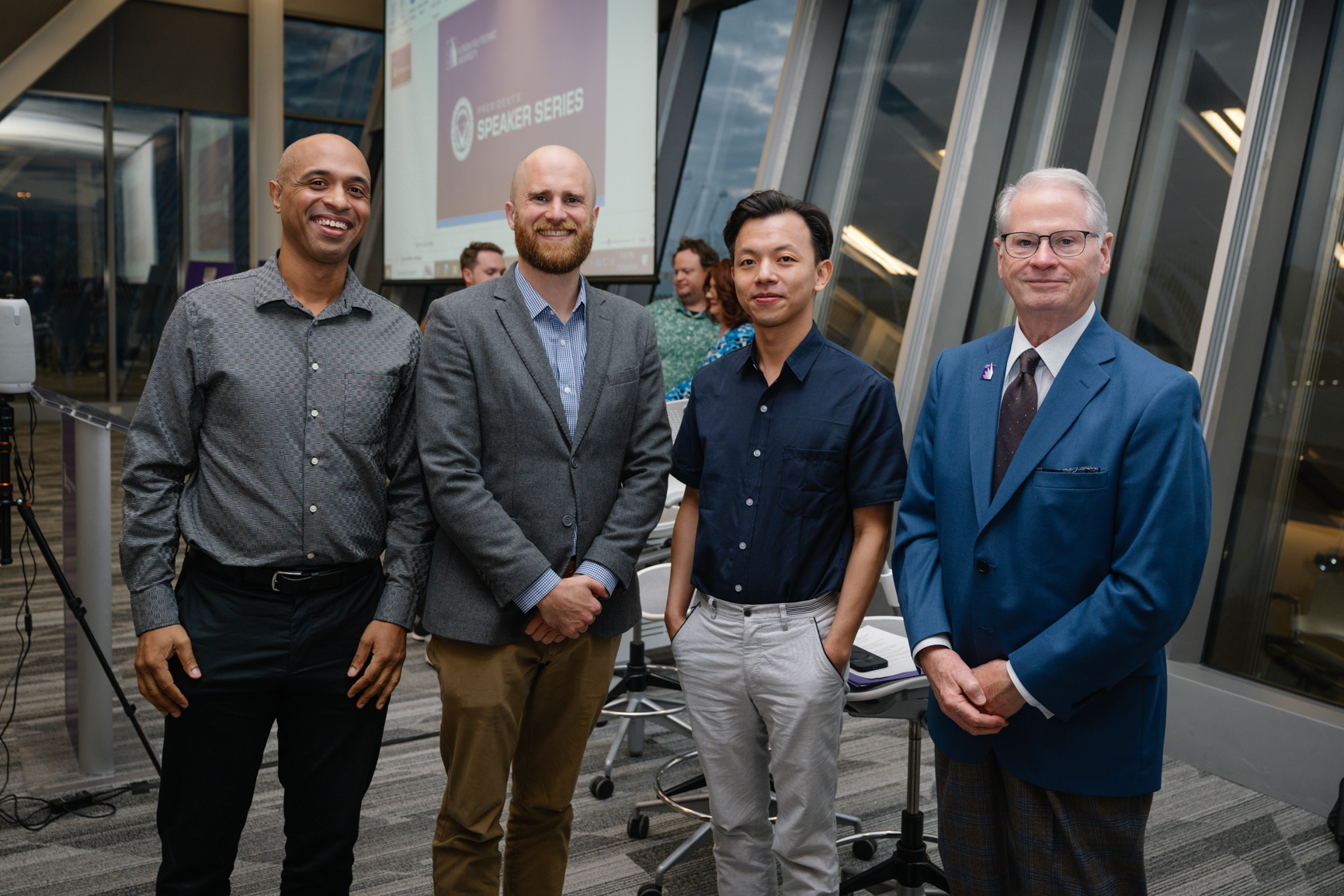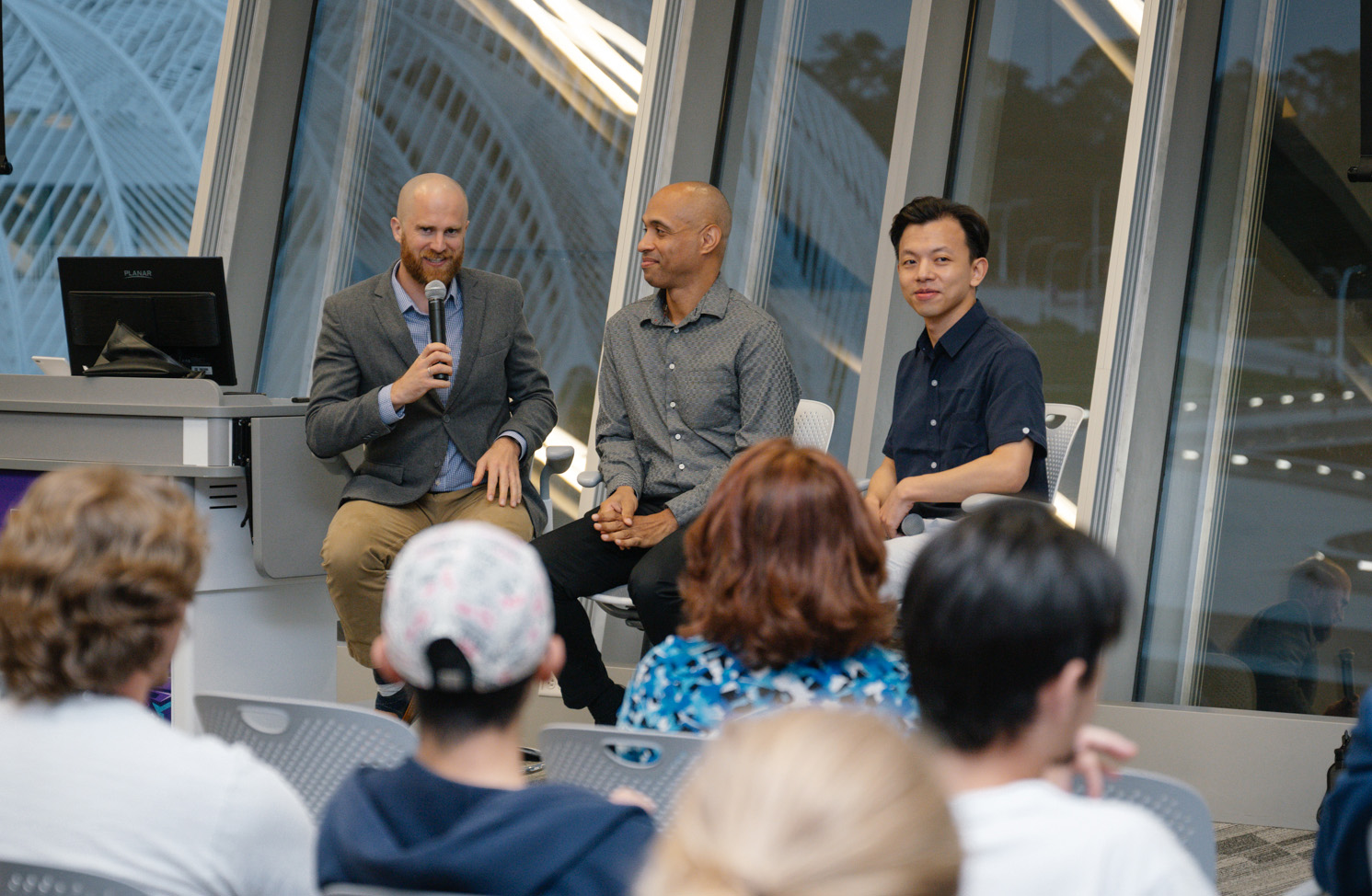
Experts in terraforming planets to increase their chance for habitability spoke at the inaugural Presidential Speaker Series event, sponsored by Duke Energy, at Florida Polytechnic University on Monday, Nov. 18. Participating were, from left: speaker Dr. Ramses Ramirez, assistant professor of physics at the University of Central Florida; moderator Dr. Dorian Abbot, Florida Poly Trustee and professor in the Department of Geophysical Sciences at the University of Chicago; speaker Dr. Howard Chen, assistant professor of planetary sciences at the Florida Institute of Technology; and Dr. Devin Stephenson, Florida Poly’s president.
Experts on the atmospheres and climates of other planets and ways to modify them for the possibility of human habitation gathered at Florida Polytechnic University on Monday, Nov. 18, to participate in a panel discussion on the topic at the institution’s inaugural Presidential Speaker Series event.
“This series is all about bringing together thought leaders and innovators who are shaping the industries that matter most to our state, our nation, and our world,” said Dr. Devin Stephenson, Florida Poly’s president. “By bringing in experts like we have today, we’ll dive into very important conversations about the challenges and opportunities that lie ahead. Together, we’re going to push the limits of knowledge and innovation.”
Dr. Ramses Ramirez, assistant professor of physics at the University of Central Florida, and Dr. Howard Chen, assistant professor of planetary sciences at the Florida Institute of Technology, discussed how what was once science fiction – the terraforming and settling of Mars and other planets – is now on its way to becoming reality. Terraforming is the process of modifying a planet or moon to make it habitable for humans.
“I see space as an extension of our own possibilities,” Ramirez said. “We should see it as a bold frontier to expand beyond our own limits.”
The event was sponsored by Duke Energy and held in conjunction with the University’s Office of Public Policy Events. It was moderated by Florida Poly Trustee Dr. Dorian Abbot, a professor in the Department of Geophysical Sciences at the University of Chicago. His research interests also involve planetary habitability.
Chen and Ramirez spoke about the possible settlement of Mars and how suitable exoplanets and moons could be made habitable. Ramirez said settlement of Mars could be in reach within a few hundred years, depending on how quickly technology advances.
“We will become a much more technologically advanced species, so there will be methods available to us in the future that we can’t imagine today,” he said.
Ramirez outlined different options for terraforming Mars, emphasizing the importance of finding ways to “live off the land” and maximize the planet’s resources. One of the first steps would be to significantly increase its temperature to allow the planet to support life.
“It’s our prerogative to ensure the survival of our species by expanding out into space,” he said.
Rather than focusing on Mars, Chen spoke about the need to create a magnetosphere, or magnetic field that surrounds a planet and protects it from solar wind and other potential harm, before human settlement can occur on multiple potential locations.
“Many of the exoplanets are in a very severe environment because they’re next to these highly active stars and may lack a magnetic sphere, but if we can create an artificial magnetosphere around them, we can make them habitable,” he said.
A crowd of students, community members, and University faculty and staff filled a large meeting space at Florida Poly’s Barnett Applied Research Center. Many in attendance asked questions about getting oxygen on Mars, timelines for progress, and what other methods for settling are possible, such as creating a base underground.
Ramirez said answers to many questions about settling on Mars will come into focus as humans continue their current path of exploration.
“I think we’ll have a much better idea once we’re there” on the planet, he said.
Dr. Dorian Abbot, a Florida Poly Trustee and professor in the Department of Geophysical
Sciences at the University of Chicago, speaks to attendees at the inaugural Presidential
Speaker Series event at Florida Polytechnic University on Nov. 18. Abbot moderated
the event, which hosted speakers Dr. Ramses Ramirez, assistant professor of physics
at the University of Central Florida and Dr. Howard Chen, assistant professor of planetary
sciences at the Florida Institute of Technology.
Contact:
Lydia Guzmán
Director of Communications
863-874-8557